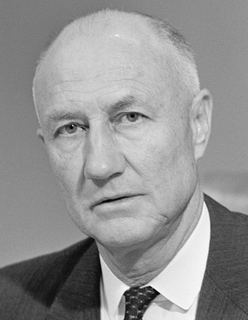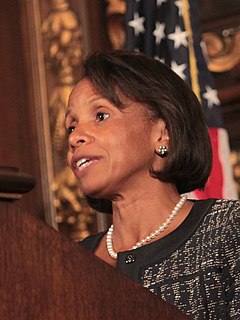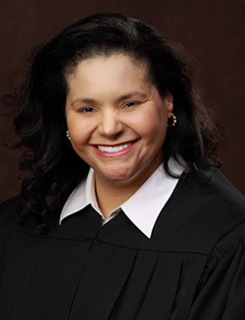Related Research Articles

The Supreme Court of Nigeria (SCN) is the highest court in Nigeria, and is located in the Central District, Abuja, in what is known as the Three Arms Zone, so called due to the proximity of the offices of the Presidential Complex, the National Assembly, and the Supreme Court.

The Chief Justice of Nigeria or CJN is the head of the judicial arm of the government of Nigeria, and presides over the country's Supreme Court and the National Judicial Council. The current Chief Justice is Olukayode Ariwoola who was appointed on 27 June 2022. He was appointed Acting Chief Justice of the Federation upon the resignation of incumbent Chief Justice Tanko Muhammad. Ariwoola serves as the Acting Chief Justice because he still has to be confirmed by the National Assembly to serve substantially as the Chief Justice of Nigeria. The Supreme Court of Nigeria is the highest court in Nigeria and its decisions are final. The Chief Justice of Nigeria is nominated by the President of the Federal Republic of Nigeria upon recommendation by the National Judicial Council and is subject to confirmation by the Senate of the Federal Republic of Nigeria. The CJN holds office at the pleasure of the Nigerian constitution and can only be removed from office by death or on attainment of age 70 whichever occurs first or by impeachment by the Senate of the Federal Republic of Nigeria which requires a super majority of the members of the Nigerian Senate.

The Thurmond rule in U.S. politics posits that at some point in a U.S. presidential election year, the U.S. Senate will not confirm the president's nominees to the federal judiciary except under certain circumstances. The basic premise is that the President and the Senate majority are of opposite political ideologies and as such the judiciary committee will not allow an appointee to receive a floor vote from the entire Senate during a presidential election year.
During President George W. Bush's two term tenure in office, a few of his nominations for federal judgeships were blocked by the Senate Democrats either directly in the Senate Judiciary Committee or on the full Senate floor in various procedural moves, including the first use of a fillibuster to block a Federal Appeals Court nominee. Republicans labeled it an unwarranted obstruction of professionally qualified judicial nominees.

The nomination and confirmation of justices to the Supreme Court of the United States involves several steps, the framework for which is set forth in the United States Constitution. Specifically, Article II, Section 2, Clause 2, provides that the President of the United States nominates a justice and that the United States Senate provides Advice and consent before the person is formally appointed to the Court. It also empowers a president to temporarily, under certain circumstances, fill a Supreme Court vacancy by means of a recess appointment. The Constitution does not set any qualifications for service as a justice, thus the president may nominate any individual to serve on the Court.
Albert Diaz is a United States Circuit Judge of the United States Court of Appeals for the Fourth Circuit. Diaz is the first Hispanic judge to serve on the Fourth Circuit. Prior to his appointment to the Court of Appeals, Diaz was a North Carolina state superior court judge and an appellate judge for the Navy-Marine Corps Court of Criminal Appeals.
U.S. President Barack Obama nominated over 400 individuals for federal judgeships during his presidency. Of these nominations, Congress confirmed 329 judgeships, 173 during the 111th & 112th Congresses and 156 during the 113th and 114th Congresses.

The Law of Nigeria consists of courts, offences, and various types of laws. Nigeria has its own constitution which was established on 29 May 1999. The Constitution of Nigeria is the supreme law of the country. There are four distinct legal systems in Nigeria, which include English law, Common law, Customary law, and Sharia Law. English law in Nigeria is derived from the colonial Nigeria, while common law is a development from its post colonial independence.

Wilhelmina Marie Wright is a United States district judge of the United States District Court for the District of Minnesota. She is the only jurist in Minnesota's history to be State District Court Judge, Appellate Court Judge and state Supreme Court justice. She was formerly an associate justice of the Minnesota Supreme Court, a judge of the Minnesota Court of Appeals, and a Judge of the Minnesota District Court, Second Judicial District.

The Federal Court of Appeal of Nigeria is the intermediate Appellate Court of the Nigerian federal court system. The Court of Appeal of Nigeria decides appeals from the district courts within the federal judicial system, and in some instances from other designated federal courts and administrative agencies. As at 2010, there are 66 judges of the Nigerian courts of appeals authorized by the Senate. These judges are recommended by the National Judicial Council (NJC), nominated by the President of Nigeria and confirmed by the Senate. There are currently seventy-two Nigerian courts of appeals across the six geopolitical zones of Nigeria. There are 12 in the North-Central, 10 in North-East, 10 in North-West, 10 in South-South, 9 in South-Eastand 11 in South Western Nigeria. The headquarter is located at Three Arms Zone, Abuja.
Ibrahim Muhammad TankoGCON is a Nigerian jurist, who has served as a Justice of the Supreme Court of Nigeria since 2006 and the Chief Justice of Nigeria from 2019 until his resignation in June 2022 citing ill-health as the reason for his decision. He was formerly a Justice of the Nigerian Courts of Appeal.
The Justices of the Supreme Court of Nigeria are members of The Supreme Court Of Nigeria composed by the Chief Justice of Nigeria other Justices of the Supreme Court not more than 21 including the chief justice, appointed by the President on the recommendation of the National Judicial Council, (NJC) and subject to confirmation by the Nigerian Senate. Justices of the Supreme Court must be qualified to practice law in Nigeria, and must have been so qualified for a period not less than fifteen years. Justices of the Supreme Court of Nigeria have a mandatory retirement age of 70 years. In June 2019, when the court had 16 justices, the president wrote the CJN, asking him as the chairman of the National Judicial Council (NJC) to “initiate in earnest the process of appointing additional five Justices of the Supreme Court of Nigeria to make the full complement of Justices of the Supreme Court” as contained in the Nigerian Constitution. After the quarter of 2020, a number of justices retired, making the number of justices to 13 justices and increasing the work load on the bench. The recommendation from the National Judicial Council for the appointment of 8 new judges in 2020 after the confirmation by the Nigerian Senate increased the number to 21 Justices. After the death of Justice Nwali Sylvester Ngwuta, the retirement of Justice Bode Rhodes-Vivour, the death of Justice Samuel Oseji, the retirement of Justice Mary Odili, the retirement of Justice Ejembi Eko and the resignation of Chief Justice Ibrahim Tanko Muhammad, it became a total number of 14 Justices in the Supreme Court of Nigeria including the Chief Justice of Nigeria.
The Rivers State Customary Court of Appeal is a court of justice of second instance that has appellate and supervisory jurisdiction over matters of customary law in Rivers State. It is presided over by a president assisted by a number of judges as prescribed by the Rivers State House of Assembly. The current president is Christy Nwankwo, having been appointed to office by Governor Ezenwo Wike since 29 May 2015.
Allison Blair Jones Rushing is an American attorney and jurist serving as a United States Circuit Judge of the United States Court of Appeals for the Fourth Circuit since March 2019.

Ada Elene Brown is a United States district judge of the United States District Court for the Northern District of Texas. She is a former trial judge of the Dallas County courts and a former Justice of the Fifth Court of Appeals of Texas. She is the first African-American woman federal judge nominated by President Donald Trump and confirmed by the Senate. A citizen of the Choctaw Nation, Brown is also one of four Native American federal judges who are actively serving on the federal bench.
Justin Reed Walker is a United States Circuit Judge of the United States Court of Appeals for the District of Columbia Circuit. He is a former United States District Judge of the Western District of Kentucky.
Cory Todd Wilson is an American attorney, politician, and jurist serving as a United States Circuit Judge of the United States Court of Appeals for the Fifth Circuit. He is a former nominee to be a United States district judge of the United States District Court for the Southern District of Mississippi and former Judge of the Mississippi Court of Appeals.
Monica Bolna'an Dongban-Mensem is a Nigerian judge. She is the President of the Court of Appeal of Nigeria. Her appointment was confirmed on Thursday, 11 June 2020.

Kathryn Kimball Mizelle is an American lawyer and jurist serving as a United States district judge of the United States District Court for the Middle District of Florida. At age 33, she was the youngest person chosen by President Donald Trump for a lifetime judicial appointment. Mizelle's nomination was confirmed by a Republican majority on the Senate after a party-line vote of 49–41 during a lame-duck session.
References
- ↑ "Senate confirms Dongban-Mensem as Appeal Court President". affairstv.com. Retrieved June 14, 2020.
{{cite web}}: CS1 maint: url-status (link) - ↑ Oshisanya, 'lai Oshitokunbo (January 2, 2020). An Almanac of Contemporary and Comparative Judicial Restatements (ACCJR Supp ... google.co.uk. ISBN 9789785120059 . Retrieved April 29, 2015.
- ↑ "12 New Appeal Court Justices Appointed, Articles – THISDAY LIVE". thisdaylive.com. Retrieved April 29, 2015.
- ↑ "Senate Confirms Zainab Bulkachuwa As Appeal Court President". Channels Television. Retrieved April 29, 2015.